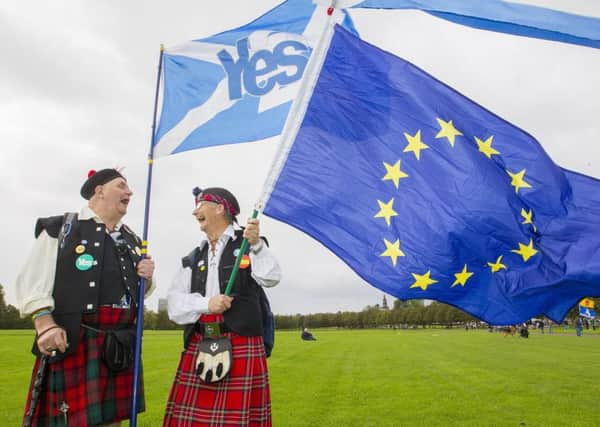Lesley Riddoch: Confidence will win or lose indyref2


According to the pollsters – yes, she does. Precisely.
A weekend Panelbase survey suggests Scotland has gone nowhere in the two years since Referendum Day with 48 per cent of voters currently backing independence – that’s down on the post-Brexit high of 52 per cent but up on the 2014 result of 45 per cent.
The poll reveals apparent deadlock on related issues too -- 46 per cent oppose a referendum in the next few years, but 33 per cent want IndyRef2 before Brexit negotiations have concluded and 21 per cent want a re-run after a Brexit deal has been concluded. A third want independence in the EU, more than a quarter want both EU and UK membership, 23 per cent back remaining in the UK after Brexit and a tenth want independence outside the EU.
Go figure.
Advertisement
Hide AdAdvertisement
Hide AdWith neither side nor any post-Brexit scenario winning a clear majority of public support, pollsters conclude Scotland is terminally stuck in a groundhog day where support for independence doesn’t grow to the 60 per cent mark that triggers Nicola Sturgeon’s indyref2, but nor does it shrivel and die so British politics can return to business as usual.
So who or what will break the stalemate?
Over the weekend, both sides have sought to prove the energy is with them.
“Still Yes” rallies in Glasgow, Oban and Inverness attracted thousands of independence supporters – “No Indyref2” petitions at stalls in several towns pulled in hundreds of signatories. Characteristically the Yes side was more energetic and colourful -- the “Reassembly” concert at St Lukes in Glasgow was organised by the umbrella group, the Scottish Independence Convention and featured speakers from the SNP, Greens and Common Weal as well as musicians, comedians and playwrights.
But hundreds of thousands of Yes supporters did not brave the drizzly rain to rally on Glasgow Green so unionist politicians will be claiming today, that support for independence is faltering and that Scots will soon wake up, smell the coffee and realise ”separatism” was just a massive distraction from “real” issues like supporting Trident, backing nuclear power at Hinkley C, leaving the European Union as quickly or slowly as “our” Prime Minister desires and starting to vote for “normal” parties again like the Scottish Conservatives and Scottish Labour.
No – however anyone tries to shape it, any future scenario for Scottish politics without the SNP or the cause of independence doesn’t sound plausible or authentic.
Business as usual has gone for good. The genie is out of the bottle. Scots know they form a distinctive national bloc within the UK in political and cultural terms. They know Scots broadly favour a social democratic model where the market is part of society and they know the vast bulk of rUK prefers things the other way round. The only question is how best to deal with that new reality.
Many commentators think the momentum is with Scottish Conservative leader Ruth Davidson – indeed former Labour MP Tom Harris says Davidson would be the “obvious choice” to lead “Better Together 2” should a second independence referendum arise.
And there, in a nutshell is the problem for the continuing No campaign.The face of the Union is now also the face of Conservatism in Scotland. Unionist voters have turned to Ruth Davidson not because they suddenly embrace her Conservative values but because she’s a more muscular defender of the Union than Kezia Dugdale or Scottish Labour.
Advertisement
Hide AdAdvertisement
Hide AdAnd things have not been standing still on the Yes side either.
The Brexit debacle has prompted some important opponents of independence to have second thoughts. Harry Potter author JK Rowling was joined last week by former Lib Dem leader Nick Clegg, who admitted fighting a second Scottish independence referendum would be very difficult given the “compelling case” made by Scots who want to remain in the European Union but are being taken out of it against their wishes. The former Deputy Prime Minister warned the Brexit process would result in a “very serious clash among the constituent parts of the United Kingdom.”
That will certainly happen.
But all the time a deeper change is taking place in Scotland and it’s a change that helps the independence cause. Voters’ confidence in the heft, nous and capacity of the British state has been eroded by the Brexit debacle and by the lack of any substantial change in powers for Scotland since 2014.
Have Scots got to stay in the EU as promised? Probably not.
Has our economy got stronger? Not in the field of renewable energy where the UK Government’s decision to end subsidies has wreaked havoc in every part of Scotland’s wind, wave, tidal, community hydro and solar industries.
Have we got a Scottish Six on BBC TV? No – and now Scots know the UK Government wants Scottish programme-makers to reflect national (for which we presume they mean Westminster-centric) political reality not the home-grown debate.
Have we got frigates built on the Clyde? No
Above all, is Scotland about to have the most powerfully devolved parliament in the world? No.
Unlike the tiny but self-governing Faroe Islands for example, Holyrood is not going to be given complete control of taxation, welfare, telecommunications or energy policy. Nor will Scotland ever achieve this level of self-government within a United Kingdom that becomes more elitist, top-down and malfunctioning by the year.
Confidence will win or lose the next indyref vote. And the new higher baseline of support for independence suggests confidence in the ability of the Scottish state – and indeed in ourselves – is slowly rising.
Two years on, that’s promising.